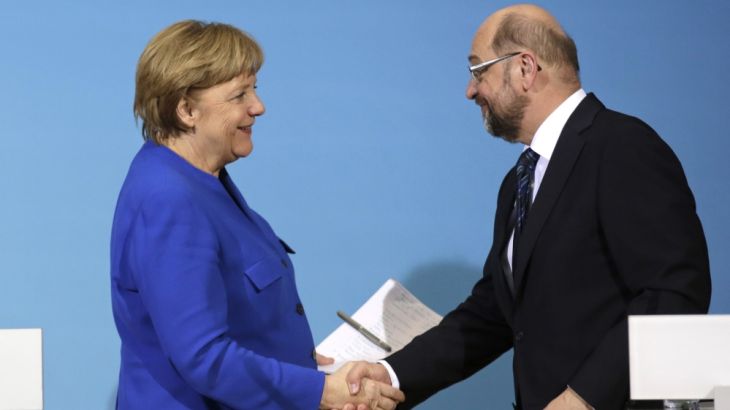Germany’s Merkel makes breakthrough in coalition talks
Germany inches towards a new government after Angela Merkel strikes deal with SPD to enter formal coalition talks.

Chancellor Angela Merkel has reached a breakthrough agreement with Germany‘s second-biggest party during talks aimed at forming a new coalition government.
The agreement comes after months of uncertainty and political paralysis.
Keep reading
list of 4 items‘Nothing to apologise for’: Merkel defends Russia legacy
The mixed legacy of Angela Merkel
What is next for Germany after Angela Merkel?
Following all-night negotiations in Berlin, Merkel’s conservative Christian Democratic Union (CDU), her Bavarian-based allies the Christian Social Union (CSU), and the centre-left Social Democrats (SPD) produced a 28-page document outlining positions on a range of issues including migration, the Eurozone and taxes.
“In the long time since the elections, we have seen that the world is not waiting for us,” Merkel told reporters on Friday.
“And as far as Europe is concerned, we are convinced that we need a new awakening for Europe,” she added.
The draft pact will form the basis of formal talks aimed at creating a new coalition government, which the CDU/CSU and SPD hope to form by April.
It helps avert new elections after September’s poll failed to give Merkel a clear majority. That vote also saw the far-right Alternative for Germany (AfD) enter the Bundestag for the first time.
Merkel initially attempted to form a coalition with two smaller parties. But those talks collapsed and the long-time chancellor turned to the SPD to renew their alliance.
Draft pact
In the draft pact, announced on Friday, the parties agreed to limit the arrival of asylum seekers to around 200,000 a year, and to work with France to strengthen the Eurozone.
It outlined tax cuts and pledged to increase spending on home-building, education and research. On the foreign policy front, the document said the parties would end weapons exports to countries involved in the war in Yemen, and rein in progress in EU accession talks with Turkey.
Jean-Claude Juncker, European Commission president, hailed the parties’ plans for Europe’s future as “very significant” and “positive”.
The draft deal still has to be approved by SPD delegates at a congress planned for January 21.
The left-leaning party suffered its worst election setback since the post-war era in September, and its leader Martin Schulz vowed to head into opposition in the hopes of increasing the party’s voter appeal.
But he reconsidered his position after Merkel failed to form a three-way coalition with the Greens and the Free Democratic Party in November.
On Friday, Schulz said that his party’s negotiators agreed to recommend to the rank-and-file to back the draft coalition agreement.
“I think we achieved an excellent result,” Schulz said. ”The coalition document is a new start for Europe. Germany will keep its strong position in the bloc if the next German government is going to be built on this document.”